Sergey Aleksashenko wants everyone to stop calling Russia weak. He contends that Russia is actually stronger than many people believe
—to include U.S. President Barack Obama and British military historian Lawrence Freedman among other prominent voices. But Russia is weak and Russian President Vladimir Putin is even weaker. Aleksashenko misunderstands Russian strength because he makes three critical errors. First, he assumes that strength and weakness are static and so fails to look at trends. Second, by focusing on the weakest of Russia’s neighbors, he fails to notice that most Eastern European states are not intimidated by Russia. Finally, he wrongly believes that Russia’s strengths can be effectively used by Putin to maintain his grip on power.
First, strength and weakness are dynamic—that is, they change over time. In spite of Russia’s current displays of military strength in Ukraine, the former superpower is steadily and irreversibly weakening. As Aleksashenko knows—better than most officials in Moscow, in fact—Russia’s current economic crisis cannot be willed into recovery, and the economy is set to break through one false bottom after another.
What is less obvious for many Russia-watchers is that the military strength demonstrated so pompously on the Red Square during the May 9 Victory Day parade is also in decline. In Ukraine, the lack of any meaningful political or strategic Russian goals erodes the morale of the troops who are clandestinely deployed there. Nervous about the domestic political consequences of growing casualties, Putin has classified information about warzone deaths as a state secret. The costs of the war are mounting, and over-spending in the Armaments 2020 priority procurement program is yet another item in the list of embarrassing fiscal setbacks. It is clear to serious Russian economists that military expenditures have been out of control for the last four quarters at least. Such spending cannot be sustained indefinitely, and deep cuts in the defense budget are certain this year.
Second, Alakshashenko’s description of Russian intimidation of its neighbors misses that many of Russia’s neighbors do not find it fearsome. While Georgia sees the need to tread carefully and avoid confrontation (even when signing an association agreement with the EU), Estonia and Latvia have turned their exposure to Russian pressure into a strategic advantage, requesting and receiving substantial support from NATO. Moscow continues its military provocations in the Baltic theater, but it realizes that the military balance there is ultimately not in its favor. In the Arctic, Finland has joined the international Arctic Challenge 2015 exercise, which makes use of the Rovaniemi air base; Finland is apparently unperturbed by the fact that Russia’s newly-formed Arctic brigade is deployed just 30 miles across the border from this city.
It is prudent of NATO to be vigilant along its northern flank, but Russia has little or no capacity for simultaneously waging two “hybrid wars.” Back in 1940, Stalin amassed some 600,000 troops for the swift occupation of three defenseless Baltic states; now, Putin can deploy only about 50,000 troops for the (very probable) upcoming offensive in Donbass.
Finally, even the strengths that Russia genuinely possesses do not necessarily strengthen President Vladimir Putin’s grasp on power. The example of Russian gas exports to Europe is a case in point. As Aleksashenko rightly points out, Russia has leverage in some ways. Russian gas exports to Europe, for instance, are essential for the economies of both, whatever proposals for alternative “green” sources the EU energy strategy entertains. This is a main source of Russia’s economic and political strength. (Though, even here, the opportunities for converting these exports into an instrument of security policy are curtailed by the joint stance of the consumers led by Germany.)
Putin’s dominance over Russian politics used to be based on redistributing the ever-expanding petro-revenues that resulted from this Russian strength among greedy stakeholders, while also ensuring some trickle-down. However, as energy prices fell and the economy tanked, he had to re-invent himself as a war leader. The triumphant Anschluss of Crimea accomplished this trick. But his sky-high popularity is fragile, requiring a massive propaganda campaign as well as new victories. Putin feels empowered by the wave of public support, but he cannot allow his artificially boosted approval ratings to start declining. He is the only decider and the only possessor of all state secrets. But managing a war, even a “hybrid” one, requires a team of able and loyal lieutenants. Putin knows uncomfortable truths about the Kremlin, rife with petty quarrels and ill-begotten fortunes, and knows there are limits to its trustworthiness. His supreme authority is, therefore, far more vulnerable than it appears. He is perfectly aware of the ugly end of quite a few fellow autocrats, who had looked so secure in their palaces, until they were not.
Putin’s Dilemma
Putin is caught in a classic trap: Russia’s military advantage is fading and certain to decrease further. He needs to exploit that advantage sooner rather later. Putin likely views the pause in the Ukraine conflict as a losing proposition, and the big guns that have resumed cannonade recently in the suburbs of Donetsk very probably spell the end of the Minsk ceasefire. Russia, having boldly skipped the phase of melancholic stagnation (zastoi), is now witnessing a rapid deterioration. Its leaders are in desperate need of a new victory to sustain public support. One thing Sergey Aleksashenko has right is that the West cannot accept the status-quo in war-torn Ukraine, cannot expect the current pause to last—and should work on non-traditional responses to Putin’s aggressive revisionism.
But such responses are more than U.S. State Secretary John Kerry was apparently able to muster during his four-hour meeting with Putin in Sochi last month. The length of that monologue (Kerry hardly had anything to say) is a good measure of Putin’s anxiety. He needs to make a decision on Ukraine before the logic of Russian weakness asserts itself. In the end, Putin is not a natural crisis manager or risk-taker and he can be deterred if the West asserts its strength.
The Brookings Institution is committed to quality, independence, and impact.
We are supported by a diverse array of funders. In line with our values and policies, each Brookings publication represents the sole views of its author(s).

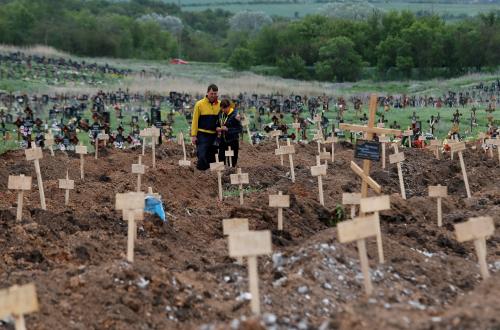
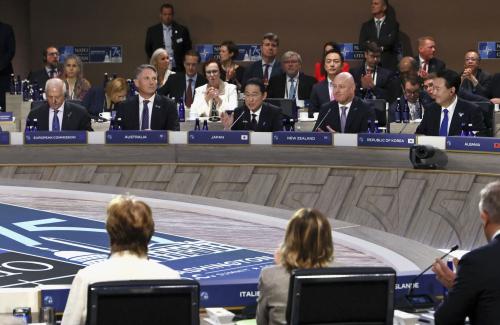
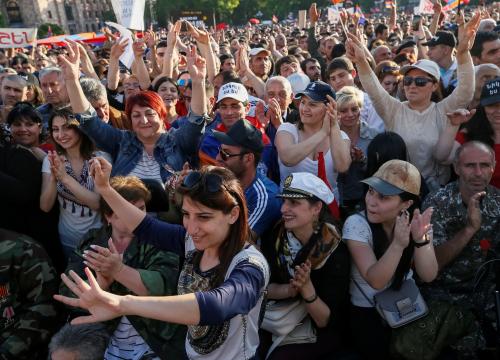
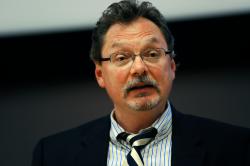
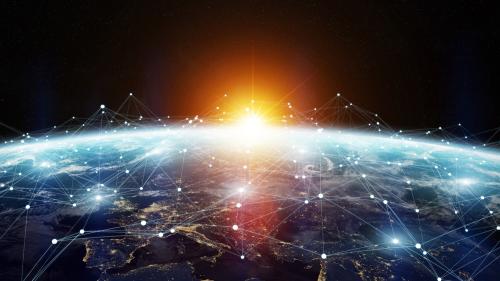


Commentary
Russia is not strong. And Putin is even weaker.
June 8, 2015